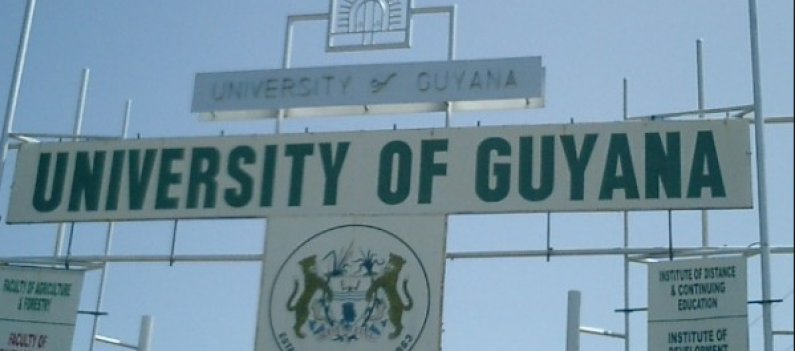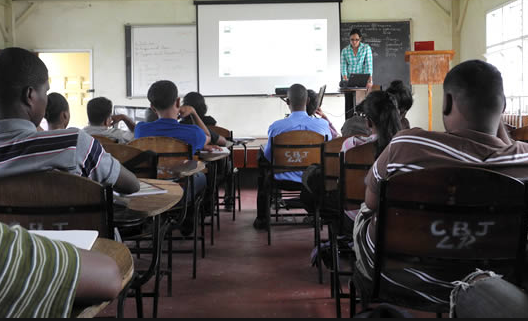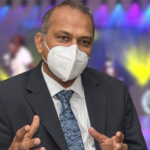
The Transformational Task Force for the University of Guyana recently held a working session and has come up with a list of recommendations for the local University.
The 30 member Task Force is made up of representatives from constituent groups of the University, stakeholders representing the Government of Guyana, the private sector, civil society, and regional and international academics and professionals.
According to a statement from the University, during the three-day working session, the task force reviewed selected studies undertaken in the last decade that would have assessed the status of the University and made recommendations for change.
It also assessed presentations on the perceived state of the University by past and present administrators, academic and non-academic staff, students, alumni, government, opposition, private sector, civil society and other persons and groups.
Additionally, the group analysed and discussed the information.
“Issues discussed at the meetings were placed into three broad heading–governance, resource mobilisation and options for funding UG, and quality assurance-academic issues/ student services. The three areas were used by the task force to make concrete recommendations on the way forward for university”, the statement said.
See List of Recommendations below:
Overall, the Task Force envisions the following:
GOVERNANCE:
- That a broad-based Committee be established immediately by the University Council to assess and make recommendations for adjustments/amendments to the University Act and University Statutes including the composition of the Council and the core competencies required for effective Governance. In this regard, it was further agreed that the University should immediately seek the formal support of the Caribbean Development Bank (CDB) to facilitate this process as part of the Bank’s Institutional Development for the University of Guyana;
- That a critical imperative in the transformation process MUST be the recognition by all stakeholders that the University of Guyana is an autonomous institution;
- 3.That there must be strict adherence to the principles of effective governance being dependent on inter alia, vision, dedication, time commitment, leadership, transparency, openness and objectivity, and trust;
- That the University of Guyana, through the Council, must be accountable to the Government, students, staff, donors, alumni and the wider Guyanese community;
- 5.That in keeping with the principle of effective governance, there should be a clear distinction between the Council’s role in approving and overseeing policy in accordance with the provisions of the Act, Statutes and Regulations and that of the Administration whose role is to execute policy and be responsible for the day to day administration of the University;
- That consideration is given urgently to the inclusion of a Legal Officer of the University as part of the Institution’s Administrative and Organizational Structure;
- That a Corporate Communications and Integrated Marketing Strategy be accorded a high priority so as to ensure a greater level of visibility for the University;
- That the new Vice-Chancellor, whose tenure should be for a minimum of five (5) years in the first instance, be given the opportunity to assess the recommendations arising from the Task Force and take the lead in executing the approved recommendations arising from the Task Force: and in addition to provide a vision, lead development of a Plan to achieve that vision and make recommendations for Administrative re-structuring as necessary.
- RESOURCE MOBILISATION AND OPTIONS FOR FUNDING UG:
- That the Office of Planning and Development be re-organised, expanded and empowered to take the lead in the Resource Mobilisation initiatives and measures identified by the Task Force;
- 2.That the Office of Planning and Development be mandated to prepare a Matrix outlining the issues and recommendations identified by the Task Force for resource mobilisation efforts, identification of timelines for implementation, and the agencies and individuals to be engaged to give effect to the resource mobilisation efforts by the University;
- Those options should be considered to enable and expect Academic Faculties/Schools to undertake initiatives to assist in supporting their academic activities (e.g. research grants, travel to meetings, etc.). Such initiatives should, include consultancies, in specific areas of Faculty/School specialisation with a cost sharing mechanism for allocating resources obtained therefrom.
- QUALITY ASSURANCE-ACADEMIC ISSUES/ STUDENT SERVICES:
- 1.Noted that quality assurance, academic issues and the provision of adequate student services at the University of Guyana are complex and involve matters requiring a refocusing of the culture of the University of Guyana to treat with these critical matters;
- That creating a profile of the University of Guyana and defining and creating the ideal University of Guyana student must be accorded a high priority;
- That urgent consideration is given to the rationalisation of the University’s Time Table to enable adequate planning for participants managing and overseeing university activities.
- That there are efforts at every level of the University to enable greater efficiency and the elimination of waste.
- That there is the immediate updating of all University Policies and the creation of Manuals for specific areas of the University operations where these do not exist;
- 6.That the University be refashioned to give the Faculties a greater role in the management of the University and that the incoming Vice-Chancellor be empowered and mandated to take the lead in mobilizing the entire University community to embrace a culture of “best practice” in every sphere of the University’s operations;
- That a Quality Assurance Unit and on-going efforts to improve the teaching skills of the academic community be established as a matter of priority;
- 8.That curriculum and curriculum reform be given priority and that the assistance of the Caribbean Development Bank be sought in facilitating this as part of institutional support to the University and capacity building as well as forging structured and formal linkages with other Universities and Colleges;
- That there is greater accountability from Academic and Administrative staff to deliver student focused and student friendly services at the University;
- 10.That there should be integrated (cross-disciplinary) approaches to programmes at all levels of the University to better enable students to be prepared for the complex work environment in the 21st century, including the creation of sustainable societies.;
- That there be greater investment in Science and Technology in the context of forging new knowledge to meet Guyana’s developmental needs;
- That the University of Guyana is part of a larger network and consequently priority must be given to engaging Regional partners/universities/institutions.












You must be logged in to post a comment Login